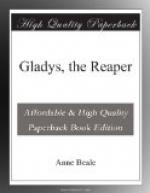’Treue, for you, Rowland Prothero. There’s my Lady Simpson was asking me to stay with her, when my Howels and I was having money enough to buy her presents, and her son and doater did go to Abertewey when they did like—and now, not wan of all the fine folks do come and say, “How was you, Mrs Jenkins?"’
Rowland ventured to repeat a few verses from Scripture, and to beg her to turn her mind to better thoughts. Then he induced her to put on her bonnet and cloak and go home with him, promising to bring her back the following day, and retaining the lodging for another week.
They passed a miserable evening. It was in vain that Rowland strove to comfort or advise his guest. She did nothing but abuse justice, and lament her son’s past grandeur.
The following day, Rowland fulfilled his promise. He left her at her lodging and went to the gaol.
He had previously obtained full permission of the authorities, through the chaplain, who was well-known to him, to visit Howel when he liked, and to give him the letters left for him by his deceased wife. The chaplain had told him that the prisoner was quite indifferent to all that he said to him on religious subjects, and listened to them, if, indeed, he listened at all, with a scoffing, incredulous, hardness of manner, that was more painful than mere carelessness.
When Rowland entered the cell, Howel was sitting with his back to the door, and did not turn or take any notice of the incomers. He had a piece of paper before him, and a pencil in his hand, over which he seemed rather to be dreaming than writing. The gaoler closed the door, having orders to remain without, and left the cousins alone.
Rowland stood some time irresolute in the gloomy cell, but finding that Howel did not move, he went round in front of him, and said,—
‘Howel!’
The word was quite sufficient. He started up, and whilst the blood rushed to his face, said coolly,—
’To what am I indebted for the honour of a visit from Mr Prothero? I think I sent you a message to the effect that I am not now in a position to receive company. My chambers are anything but suited to convivial society, and I prefer solitude just at present. I have already had the benefit of clergy, and do not need any of your sermons, excellent as I am told they are. Indeed, divinity was always out of my line.’
’I come to fulfil the dying request of your wife and my sister, which that letter will explain,’ said Rowland, calmly and gravely, placing an open letter on the table.
Howel’s countenance changed at once—the flush of passion passed away, and left a painful pallor, whilst the sarcastic mouth became compressed into a marble rigidity. He sat down again, and pushing aside the paper that had previously been before him, drew the letter towards him. He put his elbows on the table, and shrouded his face so that Rowland could not see him, and bending over the letter, gazed on the writing without attempting to read, as one might gaze on a spirit without daring to speak to it. The letter was, indeed, a voice from the dead, and dated the very day before that on which Netta died. Its contents were as follows:—




